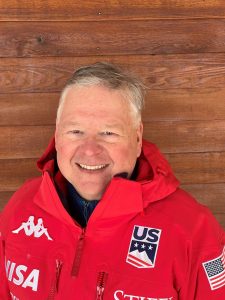Experiencing a Johns Hopkins Medical Grand Rounds presentation made a lasting impression on Peter Jennison. The neurosurgery patient and his daughter learned about magnetic resonance guided focused ultrasound (MRgFUS) — a potential treatment for brain tumors and other neurological illnesses. The event inspired Jennison and his family to continue their philanthropic support of the Department of Neurosurgery.

“At the end of the presentation my daughter turned to me and said, ‘This is incredible. Let’s help,’” remembers Jennison, who’s been fighting rare brain tumors since 1995. He agreed the information was groundbreaking and wondered if MRgFUS could one day treat brain tumors instead of radiation or surgery.
Jennison has endured hemangiopericytomas, skull base tumors that involve blood vessels. The condition led him to Johns Hopkins in the early 2000s where he met with neurosurgeon Henry Brem, MD, director of the Department of Neurosurgery and the Harvey Cushing Professor of Neurosurgery.
Jennison has undergone multiple craniotomies, the surgical removal of the bone from the skull to expose the brain. The bone flap is temporarily removed, then replaced after the brain surgery is complete. “Henry has taken impeccable care of me,” says Jennison. “I was struck by the quality of care at Johns Hopkins. Everyone is superb.”
Throughout the years, Jennison has developed an impactful relationship with Brem and the department, from establishing endowed professorships to volunteering his time with the Neurosurgery Advisory Board. Jennison was named the new board chair in October 2023.
We spoke with Jennison about his giving, the importance of Hopkins research, and why he became an advisory board member.
When my neurosurgeon in New York retired, I interviewed all over. A friend of mine told me about Henry Brem at Hopkins, and my wife and I came to interview him. I am a security analyst by training so I’d done all my homework, and he is a rock star on top of his game with an impeccable reputation. My wife and I were in awe of his kindness.
After my first craniotomy with Henry in 2006, I wanted to show my appreciation. Post-surgery, I traveled to Baltimore from New York every six months for checkups, and my relationship with Henry and the department proceeded nicely. About a year or so after my surgery, I was asked to consider joining the advisory board. I said, ‘Absolutely. I would be honored.’
I became an active board member in 2007, always trying to help with fundraising and offer any financial advice. I’m inspired to volunteer. It’s a desire to help and give back to something that’s meaningful to me.
If there is one thing I’ve spent my professional career doing, it is understanding and investing in the best-run organizations in the world. Nurturing and encouraging talent is one of the top jobs of any senior person in any business. It’s my instinct, and therefore it’s what I’m trying to do. I believe Hopkins deserves it. For the rising professorship, we liked the notion of giving younger, rising professionals extra help and encouragement — they’re the lifeblood of any organization.
My second craniotomy was with Henry and Dr. Bettegowda, who was Henry’s chief resident at that time. Henry and Chetan are helping everybody at a rapid clip. They’re developing new ways to approach, analyze, and treat neurological conditions: brain tumors, spine issues, and pediatric issues. My passion is research, and I give to the brain tumor angiogenesis fund once a year.
Better outcomes for all: advancement of cutting-edge science and technology and accessibility to more people. I want Hopkins to remain at the forefront. I have chosen to focus on neurosurgery and neurosciences because it’s been a part of my life for 29 years. I want to help in any way I can. I’d like to look at myself in the mirror at the end of the day and say, ‘I did some good.’
Topics: Faculty and Staff, Friends of Johns Hopkins Medicine, Johns Hopkins Medicine, Neurosurgery, Fuel Discovery, Promote and Protect Health